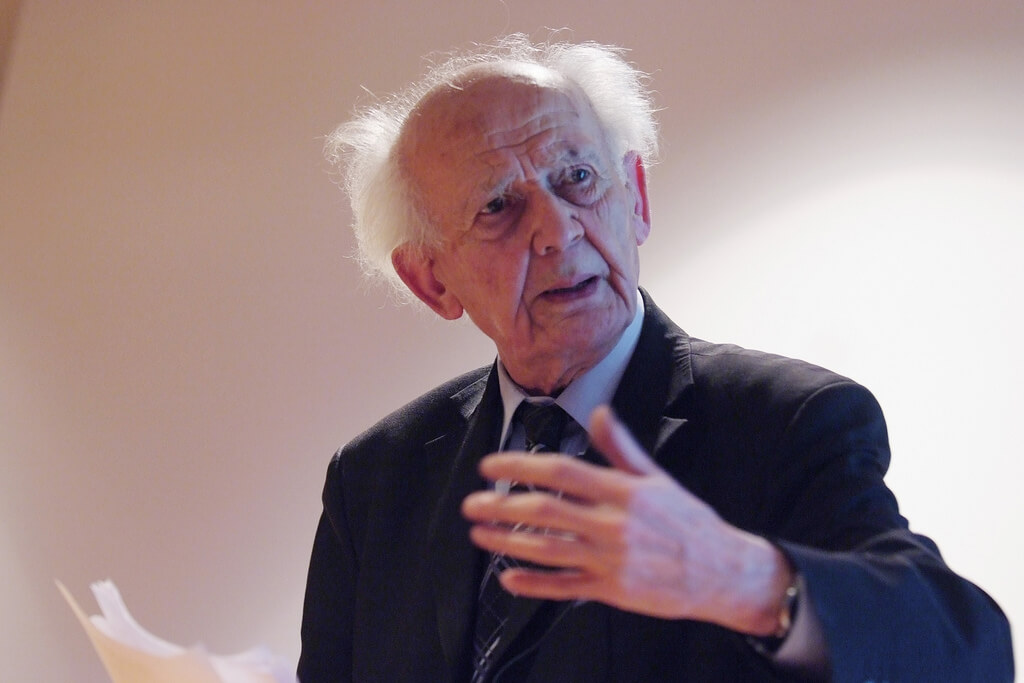Liquid Love: The Love of the 21st Century?

Imagine an old man appearing, with a friendly bald face, smoking a pipe, telling you that “cellphones help you stay connected to people who are far away from you. Cellphones allow you to stay connected…by keeping you at a distance.” This is a quote from the late Zygmunt Bauman, who coined the term liquid love, among other “liquid” things that seem to define our reality.
Now, I’m going to take you on a little journey through the concept of liquid love as defined by Zygmunt Bauman. We’ll try to untangle whether it really is the true reality of love in the 21st century. What do you say?
Who is Zygmunt Bauman?
Before we move forward, it might be a good idea to get to know Mr. Bauman a little more. This seemingly endearing old man was actually a successful Polish philosopher and sociologist. Sadly, he passed away just a few days ago.

But for his posterity, he left a ton of work on modern topics like social class and postmodernism. After the 1950s, amidst the reverberation of important events like the Holocaust and the rise of socialism, he turned his gaze towards more modern topics related to the end of the 20th century and the beginning of the 21st.
In his final years, Bauman’s work turned towards postmodernism, globalization, consumerism, and the new poverty. From there rose the concept of liquid modernity, which brings us to our focus today: liquid love.
Liquid love in the modern world
Bauman used the word “liquid” to explain the way he views modern societies. To him, our relationships are made up of fragile bonds. Hence the liquidness, the malleability, the ease with which elements in their liquid state can be divided.
Unfortunately, this Polish philosopher’s sharp mind viewed modern society as a temporary world. Most of the people in it seek temporary satisfaction – something immediate that will make us happy for a moment. But the next moment, it’s gone, and a few seconds after that, almost forgotten.
According to the writer, this is because self-love, one of the elements of relationship love, is also liquid. How can we love another person if we don’t love ourselves first? What will we offer them if we don’t have anything valuable? What will we respond with when they offer something valuable to us? Our lack of self-esteem causes our relationships to dilute in a matter of seconds.
“I’m leaving, like the water that drips through my hands, I’m leaving.”
-Manuel Alejandro-
That’s why, in his uniquely poetic way, Bauman came up with the term liquid love, which is reflected all over the world today. It escapes from our hands because we can’t solidify it and grab hold of it with enough strength, not even our own self-love. We live in an ephemeral, instantaneous world like collectors of liquid events. Every day it gets even harder to create a solid reality made up of self-love and authentic relationships that last over time with enough consistency.
The need for self-love to establish real relationships
For Bauman, modern humans need strong commitments. And the first has to do with yourself. Without self-love and personal responsibility, without the ability to transcend, we’ll hardly be prepared to build solid relationships.

The writer believed that in today’s world, we establish connections more than relationships. Going back to his quote about cellphones, technology allows us to be in contact, but we don’t use it to deepen our relationships, we use it to make connections.
Interestingly and paradoxically, the less important we are, the more individualist we become. Also, precisely in this context, we have time-sensitive needs that satisfy us momentarily. Fleeting events with a beginning and an end, and even passing from real to virtual.
How to give liquid love a taste of reality
Liquid love is becoming more and more unreal. The relationships we establish are insubstantial and lack meaning and commitment. However, we can’t get carried away by discouragement and fleetingness. Luckily, we have a powerful tool at our disposal to fight against the insubstantial nature of liquid love. It’s called education. But in order to use it and get results, it has to start from childhood.
It’s necessary to raise children to be secure, have a high self-esteem, be aware of themselves, and establish real and lasting relationships. Raise free children who have the ability to think for themselves and are secure in themselves.
“To love means opening up to that fate, that most sublime of all human conditions, one in which fear blends with joy into an alloy that no longer allows its ingredients to separate.”
-Zygmunt Bauman-

However, it seems our children, much like us, are doomed to the liquid love of a liquid reality in a liquid world. Or at least that’s what Zygmunt Bauman thought. What do you think?
This text is provided for informational purposes only and does not replace consultation with a professional. If in doubt, consult your specialist.








